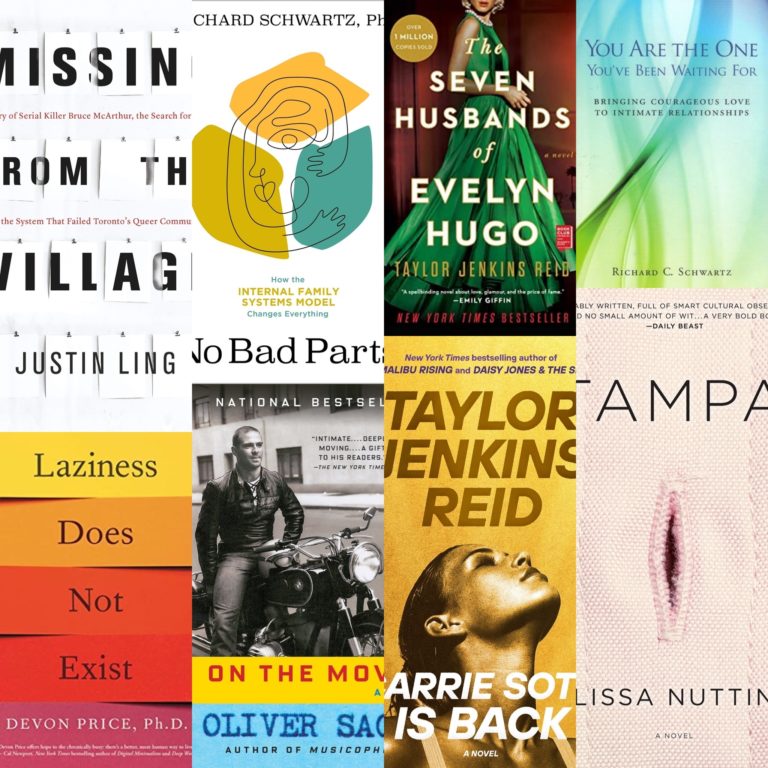
Ever walked into a really great bookstore and felt a chill go up your spine that was almost erotic? Yeah, me too.
Gosh, I love books. I don’t know if I agree with John Waters’ famous quote on books, “If you go home with somebody and they don’t have books, don’t fuck ’em,” because people consume the written word in so many different mediums now – but I know that I’d be hesitant to date someone who couldn’t at least converse with me about the books we each enjoyed.
Goodreads tells me that I read about 31 books this year, and as is tradition, I’ve picked 8 of my favorites to tell you about. Here they are, in the order that I read them:
Missing from the Village: The Story of Serial Killer Bruce McArthur, the Search for Justice, and the System that Failed Toronto’s Queer Community by Justin Ling
Available at Bookshop.org and Amazon.com
I remember how it felt to be a member of Toronto’s queer community a few summers ago, when there were vague rumblings of a serial killer on the loose amongst us. Several people had disappeared mysteriously at gay bars and other areas in the Village, many of them queer men of color. The police didn’t seem to be doing anything about it, unsurprisingly. My queer friends and I would tell each other even more emphatically after nights out, “Text me when you get home safe, okay?” because we just didn’t know what was going on, and we were scared.
Through a series of events which are diligently described in this book, it was eventually discovered that the serial killer walking among us was a landscaper and former mall Santa who was targeting queer men of color, particularly those who were immigrants and whose far-away friends and family might not notice they’d gone missing. While the killer is in prison now, and will be until he’s at least 91 years old if he even lives that long, the damage he had done to our community, to his victims and to their friends and family was insurmountable and could never be taken back.
Justin Ling is a Canadian investigative journalist who took an interest in this story, and in this book he digs into what exactly happened, why police were so negligent in this case (hint: racism and homophobia were big factors, as you’d expect), and how the killer was identified and apprehended. It’s a fascinating and harrowing look into crimes that should never have been swept under the rug.
No Bad Parts: Healing Trauma & Restoring Wholeness with the Internal Family Systems Model by Richard C. Schwartz
Available at Bookshop.org and Amazon.com
I really can’t overstate how much Internal Family Systems therapy has helped me this last year. I had struggled for over a decade with managing the torrential emotions that would sweep over me whenever I got triggered, and IFS is the only modality that has given me tools which have actually helped with this problem. It has helped me learn to be more compassionate towards myself and others, and to comfort myself when I am upset in addition to asking for what I need from the people in my life.
Richard C. Schwartz is the inventor of Internal Family Systems. Trained in family therapy, he took his knowledge of dynamics amongst groups and couples and began using those same paradigms on the individual self, seeing each person as being made up of “parts” which have conflicting desires, fears, motivations and tactics. What all of these parts have in common, though, is that they all ultimately share the goal of keeping you safe and protecting you from difficult emotions – it’s just that they sometimes do this in ways that seem baffling or counterproductive. The “parts” inside a person who’s endured trauma, Schwartz says, are essentially just children, frozen in time at the point in your history when you experienced that trauma – so if you notice yourself feeling like a snivelling 6-year-old girl or a tantrum-throwing 8-year-old boy when you’re triggered, what is needed is the care and compassion you would show to an actual child of that age who was having that level of emotional response.
No Bad Parts is one of several books Schwartz has written about IFS, and it’s a good introduction to the model. I’d still recommend that beginners to IFS see a therapist trained in this modality if they’re at all able to, because it can be extremely helpful to have a calm, wise person steer the ship through your tumultuous emotions with you when you haven’t learned how to do so yourself yet. But even if you can’t access therapy, I still think this book could be transformational for many people. It certainly has been for me, by helping me understand better what my therapist is actually doing when they implement certain IFS techniques, and how I can implement those techniques myself when I’m alone.
The Seven Husbands of Evelyn Hugo by Taylor Jenkins Reid
Available at Bookshop.org and Amazon.com
I picked this up because several people I follow online had mentioned that they “couldn’t put it down” once they started reading it. I literally didn’t know anything about it going into it, and that’s probably the ideal way to consume this book.
So how do I explain why I loved it so much, without giving spoilers? All I can really say is that if you’re a fan of old Hollywood – the movies, the celebrity culture, the glamour of it all – and are a romantic, you’d probably enjoy this, especially if you’re queer.
It made me want to wear a green satin ballgown every day. It made me want to pursue the things I want, and the people I want. It made me want to be the loudest, boldest, bravest version of myself, if just in honor of the people who came before me who weren’t able to do that. I loved it and cried through most of it, which (coming from me) is a huge compliment.
You Are the One You’ve Been Waiting For: Bringing Courageous Love to Intimate Relationships by Richard C. Schwartz
Available at Bookshop.org and Amazon.com
I wasn’t sure whether to include another book I read by the Internal Family Systems founder about his therapeutic model, but honestly both of these books have changed my life so much that it would be weird not to mention them!
You Are the One You’ve Been Waiting For is much more relationships-focused than No Bad Parts. In particular, a lot of it is about how trauma can make us more susceptible to viewing certain people as our “redeemer,” someone whose love will somehow “fix” us and make it so that we’re never sad or lonely or rejected ever again. This can be a highly damaging way to view your relationships, both for your loved ones and for yourself, and yet it’s how a lot of people think about love. It’s even how our culture encourages us to view love, if the many many media depictions of “romance = happily ever after” are to be believed.
This book discusses the ways that IFS techniques can be used to heal negative relationship patterns, like always trying to change a partner so they’ll be who you want them to be, or always trying to change yourself to fit what you think your partner wants. And although this book wasn’t written with polyamory or other forms of non-monogamy in mind, I think it dovetails nicely with a lot of resources on polyamory and trauma, because it can help you address the root causes of your strong reactions to jealousy, rejection, and the threat of abandonment.
Tampa by Alyssa Nutting
Available at Bookshop.org and Amazon.com
Someone described this book to me as “a gender-swapped Lolita” and I was intrigued. Lolita is one of my favorite novels, not just because the writing is beautifully lush and witty, and not just because it launched a thousand erotic tropes, but because of how skilfully it makes powerful statements about consent and control via its unreliable narrator Humbert Humbert. While often interpreted by critics as a defense of pedophiles and their crimes, I see Lolita far more as a warning to the world about what can happen when we trust “unreliable narrators” just because they’re male/white/well-to-do/[insert other markers of systemic power and privilege here]. Much like Missing from the Village, Lolita points out the ineptitudes of authority figures whose unexamined biases lead them to ignore, dismiss and belittle the disempowered people most in need of their help.
Tampa is indeed, in many ways, a gender-swapped Lolita. It’s a novel about an adult woman who is sexually fixated on young boys, and the lengths to which she will go to scratch her pedophilic itch. Like Lolita, it forces the reader to grapple with their own notions of consent, control, agency, desire, and justice. And also like Lolita, it encourages us to understand the problem of pedophilia from a more humanizing angle, without letting abusers off the hook for the terrible things they do.
While obviously quite disturbing, Tampa was a compelling read. I especially found it interesting to note the ways that women who abuse their power can so often be viewed as less of a threat than men who do the same, for obvious reasons, even though they can behave just as horribly and can be every bit as morally bankrupt as their male counterparts.
Carrie Soto is Back by Taylor Jenkins Reid
Available at Bookshop.org and Amazon.com
Since I enjoyed her previous book The Seven Husbands of Evelyn Hugo so much, I decided to check out Taylor Jenkins Reid’s newer novel, Carrie Soto is Back. It’s about the comeback tour of a fictional female pro tennis player – why she decides to return to the game after some time away, and what happens when she does.
I’m not a sporty person at all, but some of my few forays into the land of athleticism have been into racquet sports, including tennis, badminton, and volleyball. So, while I found the athletic aspects of this book mildly interesting, mainly what pulled me in was the relationships between the characters, and the way that Carrie is so driven by her desire to be the best that she often ends up pushing people away and hurting herself in the process.
I think this story is instructive for anyone who measures their value by their professional success. I’ve certainly been there, and it was affirming to see those struggles reflected in these pages, even though Carrie is a world-famous tennis star who tours the world, and I am a freelance writer who reviews dildos from my bedroom. (One thing we have in common, at least, is that we both know a thing or two about balls.)
On the Move: A Life by Oliver Sacks
Available at Bookshop.org and Amazon.com
Oliver Sacks is one of my all-time favorite writers. He was a neurologist, and rose to fame for his gorgeously-written case studies compiled in many books, which examined the relationship between neurology and the human condition. I loved, for example, his book on how music affects the brain and vice-versa, Musicophilia, and his tales of visual and ocular disturbances in The Mind’s Eye.
On the Move is quite different, though: it’s one of his memoirs. It was published the year that he died, and shows him reflecting back on his life and the wisdom he’s accrued from it. In particular, this is one of the few Sacks books where he discusses in detail the fact of him being gay, and the ways that homophobia shaped the course of his life. But there are also lots of fun stories in here, tales of zooming across the country on a motorbike, playing chess on LSD, and falling in love for the first time. It’s a beautiful book, written by a beautiful man, and is one of the most intimate glimpses available into one of the great minds of the 20th century.
Laziness Does Not Exist by Devon Price, Ph.D.
Available at Bookshop.org and Amazon.com
I haven’t even actually finished reading this yet, but it’s already changed my life, so I feel compelled to mention it.
The provocative title of this book is indeed its central thesis. Laziness does not exist. Read that slowly, word by word, and notice the resistances and arguments that start coming up immediately in your mind. Do they sound like you? Or do they sound like your dad, your 4th-grade teacher, your first boss, or the disembodied booming voice of capitalism itself? More than likely, those voices aren’t coming from you – and more than likely, those voices are wrong.
In this book, social psychology professor Devon Price makes an incredibly persuasive argument for the idea that “lazy” people always have their reasons for being lazy, whether those are related to depression, anxiety, chronic illness, neurodivergence, trauma, burnout, or some combination thereof. But this book isn’t just theory – it’s packed with advice on how to materially change the circumstances of your life so that you will have more energy and take more initiative in the areas that actually matter, while also forgiving yourself for needing rest and making sure you get enough of it.
What were your favorite books you read this year?




